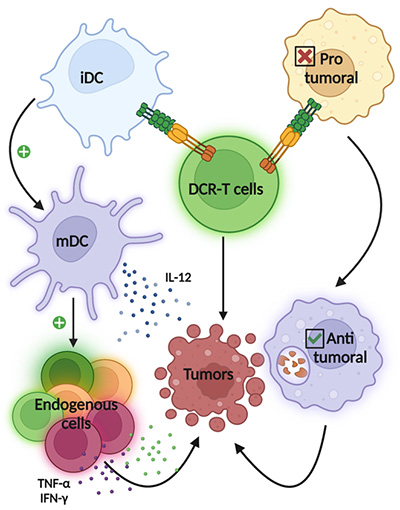Catalyzing Endogenous Antitumor Immunity with Dual Costimulatory Receptors (DCR)
 Adoptive cell therapy (ACT) is an exciting therapeutic strategy that uses genetically-engineered immune cells to target and destroy tumors. However, engineering strategies to enhance ACT typically focus only on improving the cell “product” and do not provide support for immune cells that are already in the patient.
Adoptive cell therapy (ACT) is an exciting therapeutic strategy that uses genetically-engineered immune cells to target and destroy tumors. However, engineering strategies to enhance ACT typically focus only on improving the cell “product” and do not provide support for immune cells that are already in the patient.
We innovate fusion proteins that combine a membrane-bound protein ectodomain with a costimulatory signaling endodomain. These novel proteins are expressed in genetically engineered T cells, for use in cell therapy.
We are developing a new class of fusion proteins, called Dual Costimulatory Receptors (DCR), that combine a costimulatory ligand ectodomain with a different costimulatory signaling endodomain. The DCR ectodomain has the potential to stimulate costimulatory receptors on the T cell and endogenous immune cells, and the intracellular domain can be used to provide costimulatory signals only to the T cell (signals that are not safe to deliver systemically). As tumor-targeted T cells actively migrate to the tumor site, DCRs will provide safer, localized delivery of positive signals to endogenous immune cells and a more powerful engineered T cell response.
We are developing DCRs to catalyze a diverse antitumor response against acute myeloid leukemia (AML), pancreatic, pediatric CNS, and other cancers. (Image created with biorender.com)
